The tidy suburbia of Borehamwood doesn’t feel like the frontline in the fight against the murderous antisemitism that saw four shoppers killed in a Paris kosher supermarket this month. But here in south Hertfordshire, the fastest-growing Jewish community outside London, residents are nevertheless braced for the worst.
As elsewhere in Britain’s estimated 291,000-strong Jewish community, schoolchildren in one orthodox enclave have in recent days been put through practice drills to not just to cope with fire but also an armed terrorist assault.
Rabbi Chaim Kanterovitz, who leads the tightly-guarded Borehamwood and Elstree synagogue from an office equipped with a screen showing 16 security camera feeds, said the Paris attacks “created a sense of panic”.
“People were not just disturbed,” he added. “They were alarmed.”
The concern is widespread. At the Kinloss synagogue in Finchley, north London, which serves Golders Green and Hendon, security was beefed up for worship and a planned half-term youth trip to Disneyland Paris has been cancelled. The rabbi, Jeremy Lawrence, cited “family apprehension about taking unnecessary risks”.
“Things are getting worse in Europe in terms of antisemitism and this is being seen in daubings, abuse in the street as well as more sensational attacks like Paris,” he said. “There is a fear of a copycat attack.”
Rising anxiety in parts of Britain’s Jewish community comes ahead of figures expected next month that will show antisemitic attacks – mostly non-violent – reached the highest level ever recorded in the UK in 2014, rising above the previous high of 931 attacks in 2009, which included 124 violent attacks, three of which involved a threat to life or grievous bodily harm.
The data, to be published by the Community Security Trust, a Jewish charity, will reflect a spike in reported antisemitism in July and August during last summer’s conflict between Israel and Hamas in Gaza. Even before the conflict began, CST recorded 22 violent antisemitic attacks and 282 other incidents, including the desecration of gravestones in Manchester and graffiti on a London home that said “All Jewish [sic] are rats”.
But this year has started worse, following the attack on the kosher supermarket in Paris on 10 January after the 7 January killing of 12 people at the offices of Charlie Hebdo magazine.
“We have had a huge, huge increase in worried and anxious people calling,” said Dave Rich, a CST spokesman. “That might be people reporting suspicious activity near Jewish buildings, people worried about security at schools and people scared to send their kids to school. It has been the worst we have seen.”
Home secretary Theresa May has now ordered increased police patrols in Jewish areas and CST, which has trained over 1,000 volunteers to guard synagogues and Jewish schools, has done the same. In recent days, they have been deployed to patrol the streets of Golders Green, Hendon and other Jewish areas in an effort to quell community concerns.
After a survey from the Campaign Against Antisemitism published last week showed that 45% of British Jews believe Jews may no longer have a long-term future in Britain, May said on Sunday: “Without its Jews, Britain would not be Britain,” and called for fresh efforts “to wipe out antisemitism”.
But feelings are running high. When Rabbi Menachem Margolin, director of the Brussels-based European Jewish Association, called for governments to “make it much easier for Jews to carry guns” to protect unguarded synagogues, many thought he had gone too far.
Taking the temperature of Britain’s Jewish community, a common concern recurs. People simply don’t know how concerned they should be.
Howard Jacobson, the Booker prize-winning writer whose recent novel, J, is set in a world after an unspeakable event, presumably genocide, told the Guardian: “Any Jew who is not frightened is mad. But you can’t live frightened every minute of the day … The condition is of radical uncertainty which makes one very jittery.” He said his feeling after the killings at the Paris supermarket was of “cold fingers at your heart, it was dread”.
“What makes it particularly frightening at the moment is the conjunction of classic antisemitism, the idea the Jews have got too much money and want to rule the world, and contemporary Islamic antisemitism, and we haven’t had that before … There is more anxiety around at the moment. I was at a Jewish event last night and everyone was talking about it.”
Jacobson, 72, said he has personally suffered very little antisemitism, but recounted an incident when a woman approached him and said: “You Jew,” and told him to “go and have a shower, you know what kind of shower I mean”, referring to gas chambers used in the Holocaust.
“Your heart races and you don’t know whether you feel strong or weak,” Jacobson said. “The main thing is you don’t know what to do.”
The frontline in the Jewish community’s security response to such attacks is a four-storey office block called Shield House, the HQ of the CST in Hendon, which bristles with CCTV cameras and anti-climb spikes.
The CST is a £7m-a-year charity funding security measures for 300 synagogues and more than 120 Jewish schools. It runs a hotline for antisemitism reports and logged more than 500 cases during the Gaza conflict last July and August.
Dave Rich said examples of abuse have included “Jewish people in the street having ‘Heil Hitler’ shouted at them by someone with a Palestinian flag hanging out of their car.”
“By pretty much every measure, the situation in Britain is better for Jews than anywhere else in western Europe,” said Rich. “But the reaction to Gaza shook that confidence. It led to a question of ‘what does the future hold in Britain for me, my children?’ For many Jews that was a very unusual feeling. People were asking ‘what are you doing to increase security at my children’s school? When are we going to get armed police?’”
The CST argues fears of a Islamist attack on a Jewish targets in the UK are well-founded. In 2012, Mohammed and Shasta Khan, a married couple from Oldham, were convicted of preparing to launch a terror attack against Jews in Bury. A year earlier, documents were discovered following the killing of al-Qaida terrorist Fazul Abdullah Mohammed in Somalia, which revealed plans to attack Stamford Hill and Golders Green.
In 2010, CST was alerted when police discovered a plot by a group of al-Qaida-inspired British Muslims to target two rabbis, Boris Johnson, the US embassy and the London Stock Exchange.
“What happened in Paris doesn’t change the threat assessment,” said Rich. “We know jihadists want to attack long-standing diaspora communities and all our security is already structured to deal with that threat. When we put on extra security it is mainly for reassurance so people can go on with their normal lives.”
Back in Borehamwood, Rabbi Kanterovitz and his colleague, Rabbi Boruch Boudilovsky, who has set up a satellite synagogue nearby to absorb the needs of a community that has grown by a third since 2001 to include 14,000 Jews, said Paris had changed feelings.
“Over the summer some Jews felt that maybe they didn’t have a political future here, but Paris was much more physical,” said Kanterovitz. “I have heard people speak [since Paris] in a way I haven’t heard before,” said Boudilovsky. “They are saying ‘I can’t see a future for Jews in the UK.’”
Rebecca Brummer, who works at the synagogue, said: “For the first time ever I don’t feel safe. We are pretty vulnerable wherever we are. They could just come in.”
“A school attack is my biggest worry,” said Lisa, a 32-year-old Jewish mother-of-two shopping in the “Just Kosher” supermarket. “The children are having to do drills for if someone enters the class.”
Other Jewish leaders are trying to keep the threat in perspective and some statistics help their case. A survey for Jewish Policy Research published last July found only 18% of British Jews had ever considered leaving the UK because they didn’t feel safe and that fewer British Jews consider antisemitism a problem than their counterparts in France, Germany, Italy or Belgium.
A 2014 survey for the Pew Research Center found that 83% of Britons polled had a favourable view of Jewish people, markedly higher than the 63% that said they had a favourable view of Muslims.
“There is more antisemitism out on the street,” said Vivian Wineman, president of the Board of Deputies of British Jews. “But Britain is a sane and healthy society and it compares very well with the rest of Europe. We shouldn’t see ‘Hitler was right’ placards on the street and Jews shouldn’t be intimidated in supermarkets buying kosher products. These things must be confronted and we have seen an upsurge in manifestations of it.”
It may also be that non-religious Jews who do not live in largely Jewish areas or send their children to Jewish schools are less anxious.
“I am sheltered and maybe I need to be more afraid,” said comedian and satirist, David Schneider. “I was thinking ‘is this how the comfortable intellectual Jew of 1930s Germany felt?’ That they don’t mean us, they mean the Ostjuden [impoverished Jews from eastern Europe], but us assimilated Jews, we’re OK. Some of my parents’ generation would say ‘never be complacent, have your suitcase packed’.
“But I am ploughing on, distressed by what happened in Paris.”
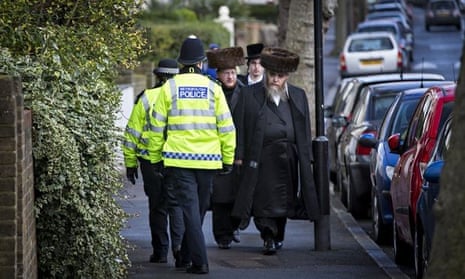
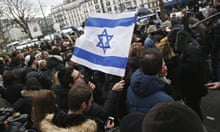
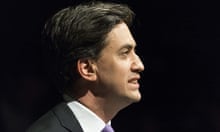
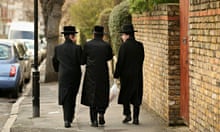
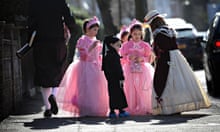
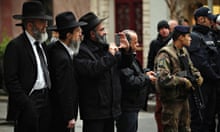
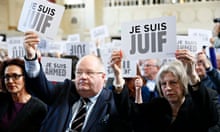

Comments (…)
Sign in or create your Guardian account to join the discussion